As someone who has completed more than five courses in filmmaking, Ron Howard Materclass holds a special place in my heart.
I enrolled in this course a few months back on the recommendation of one of my friends; initially, I assumed it was nothing but another similar course that was valuable in the market.
However, after watching a few lessons in this course, things turned out differently; I realized this course is not a series of video lessons but the ultimate guide to mastering filmmaking skills.
In this Ron Howard Materclass Review post, I will share everything you need to know about this course, from its topic to things I liked and whether you should invest your hard-earned money or not.
Let’s see what this post covers about Ron Howard’s Masterclass on Filmmaking
- About Ron Howard
- Overview of the Ron Howard Masterclass
- Things covered in Ron Howard Masterclass
- Who should consider Ron Howard’s Masterclass?
- What did I like about Ron Howard’s Masterclass?
- Pros and cons of the Ron Howard Masterclass
- Is it worth buying the Ron Howard Masterclass?
And a lot more, so let’s get started without any further delay and explore the Ron Howard course that teaches about filmmaking.
Quick Summary of Ron Howard Masterclass
What you will learn: The art of filmmaking and its process, including choosing a story, evaluating the script, finding inspiration, working with actors, reconstructing scenes, conducting research, and many more.
Run Time: 32 video lessons (7 hours 48 minutes)
Who should consider: Aspiring Filmmaker, Aspiring Directors, Filmmaking students, and anyone serious about making a carrer in filmmaking and learning from the experts.
Recommendation: 8/10 (It is one of the comprehensive guides on filmmaking that covers everything you need to know, along with case studies and real-life examples)
Ron Howard Masterclass Review in 2025
About the Instructor: Who is Ron Howard?
Ron Howard is an Academy Award-winning filmmaker and one of the most popular directors of this generation. He is known for creating dramas and hit comedies, some of which include A Beautiful Mind and Apollo 13, and hit comedies like Parenthood and The Splash.
Additionally, He has created some of the most memorable Hollywood films, but things were not easy for him; he went through many ups and downs but did not give up.
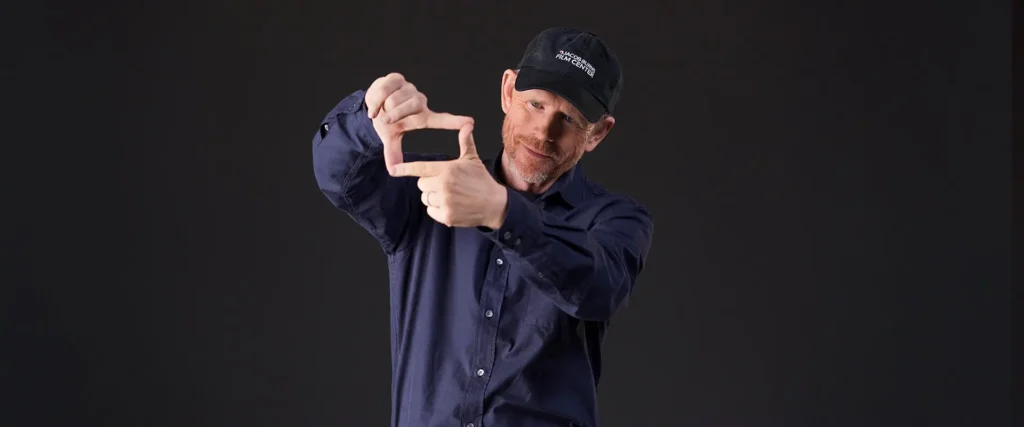
Later, He made his directorial debut in 1978 with the comedy Grand Theft Auto and gained immense popularity among his fans.
Before making films, he worked as an actor and appeared in films such as The Journey and The Music Man and in the popular TV shows The Andy Griffith Show. In this journey, he has received many awards and recognitions; here are a few of them.
- Won Academy Award for Best Director for “A Beautiful Mind” in 2002.
- Received the Oscar for “Apollo 13” and “The Da Vinci Code.
- Earned BAFTA Award for Best Direction for “Frost/Nixon.”
- Multiple Emmy Awards for TV series like “Arrested Development.
- Received the National Medal of Arts from President Obama in 2013.
In his first-ever masterclass, he teaches you about everything he has learned to become one of this generation’s most successful filmmakers and popular directors.
Moreover, you will learn various things, including creating a story, writing a script, developing a film, collaboration, production, and his own case studies, which have covered everything you need to know.
Now let’s jump right in and understand the topics this masterclass covers about filmmaking.
Ron Howard Masterclass Review: Overview
Ron Howard’s masterclass is one of the most comprehensive courses on filmmaking. It includes 32 videos that last 7 hours and 48 minutes. It seems a very lengthy course, but believe me, every lesson is worth watching.
Howard has laid out some of filmmaking’s important concepts and components, such as writing scripts, evaluating scripts, creating the story, collaborating with different people, and developing exceptional films, which help you build a strong foundation at the start of your journey.
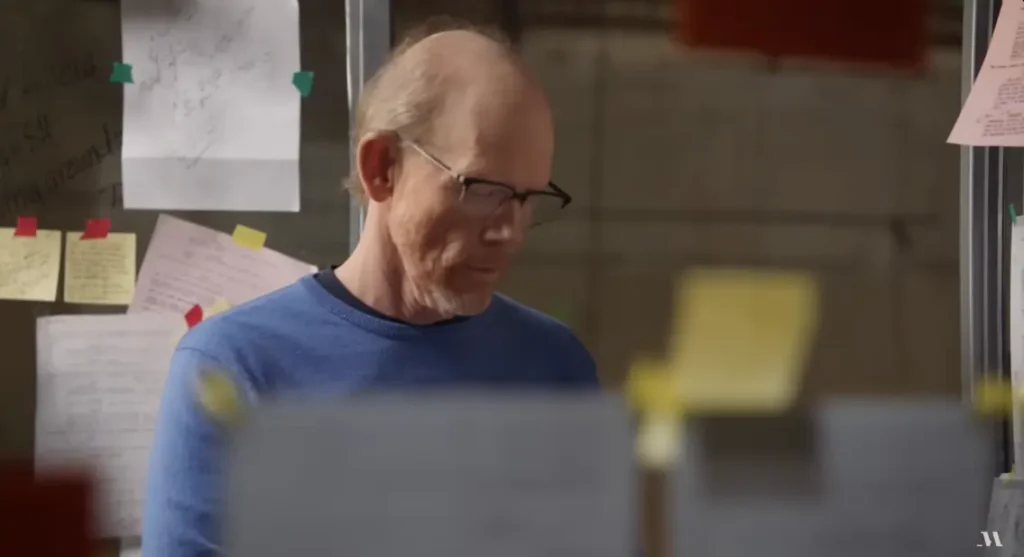
He has covered every vital aspect of directing and filmmaking that makes a successful Filmmaker; let’s have a quick overview of what this course covers and explains about directing.
- Introduction
- Choosing a Story
- Evaluating a Script
- Refining a Script
- Story Inspiration: Case Studies
- Developing the Film
- Collaboration: Part 1
- Collaboration: Part 2
- Working with Cinematographers
- Cinematography
- Production Design
- Case Study: Frost/Nixon
- Research
- Scene Deconstruction: Raiders of the Lost Ark
- Scene Deconstruction: Apollo 13
- Scene Deconstruction: A Beautiful Mind
- Casting
- Working with Actors: Part 1
- Working with Actors: Part 2
- Frost/Nixon: Read-through & Staging Rehearsal
- Frost/Nixon: Feature Staging for Masters
- Frost/Nixon: Feature Staging for Coverage
- Frost/Nixon: Alternate Staging Possibilities
- Frost/Nixon Steadicam Staging
- Frost/Nixon Steadicam Staging for Frost POV
- Frost/Nixon: Staging for Indie Shoot
- Frost/Nixon: Staging Review
- Editing: Part 1
- Editing: Part 2
- Sound Design
- Music and Scoring
- Find a Story You Love
Additionally, he has shared his journey and how he found a passion for filmmaking; from my experience, lessons will help you connect more with your instructor, and you will learn better.
Unlike any other course, this masterclass also contains the work that you get at the end of this class, which allows you to implement what you learn from this masterclass.
Inside look at the Ron Howard Materclass
You have seen the overview of this masterclass and the subject each of the lessons covers; let’s move on to the next part, which will include an in-depth review of each lesson and a decision about whether it’s worth considering this course.
Introduction
Unlike any other, this course also starts with an introduction in which Howard shares his personal journey from being a child actor to becoming one of the most popular directors of this generation.
Additionally, he also walks you through some of his personal experiences playing roles in various shows and movies, such as the Andy Griffith Show and Happy Days, and how those experiences shaped his understanding of storytelling and building character.
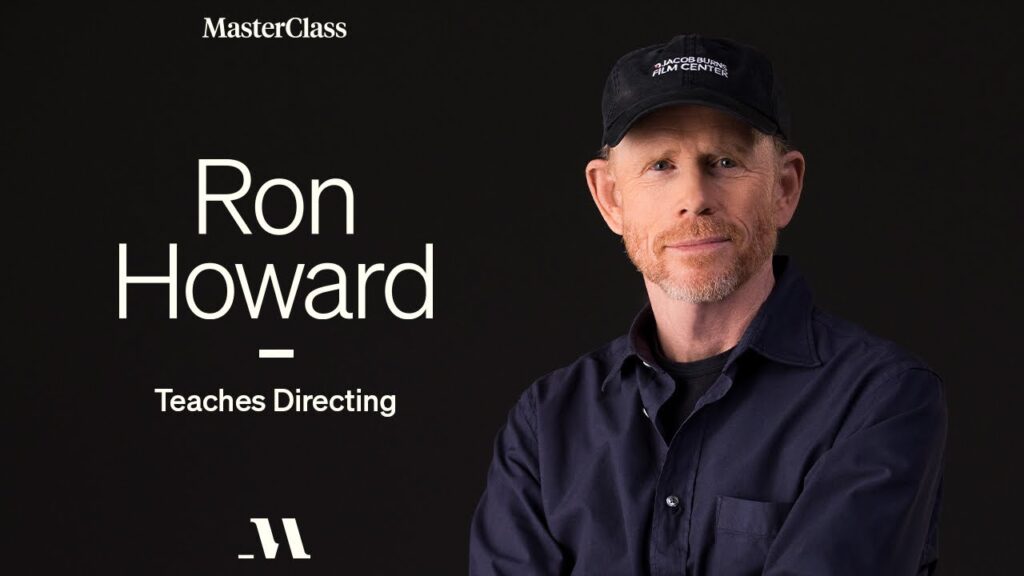
Choosing a Story
Stories are always one of the best ways to connect with your audience, convey your message, and grab their attention. People have been using this method for a long time; from your grandma to your favorite influencer, everyone is using this technique.
In this lesson, Howard teaches you how to find ideas for creating stories that grab people’s attention and convey the right message to your audience.
Coming from an acting background and later making various films, he discovered the secret of creating stories that draw the attention of people and hook them to watch your story till the end.
Lastly, he used his recent films and breakdowns as an example of what makes these stories so powerful that the audience cannot leave them without watching them.
Evaluating a Script and Refining a Script
This lesson combines the two lessons in which Howard teaches you about evaluating and refining the script. In the first section, he gives you the list of questions and the checklist that he personally uses to evaluate the script and rate it based on potential audience satisfaction.
Similarly, in the next part, he shares his personal approach to refining the script and making essential changes to make it an exceptional piece that connects with the audience.
One thing that could be improved in this lesson is Howard’s ability to give me examples to explain things better. However, he has shared some of the fundamental questions to decide whether it’s worth your time or not.

Story Inspiration: Case Studies
As the name suggests, in this lesson, Howard shared his complete process of finding the themes of the stories and explained what message each conveyed to the audience.
The good news is that to explain this concept better, he has seared specific examples from his films, like Apollo 13, A Beautiful Mind and a Splash, and illustrated how real-life events can become one of the best inspirations for designing compelling Stories.
Moreover, he also walks you through his research process in detail, teaching you how to find inspiration for the character development and the story.
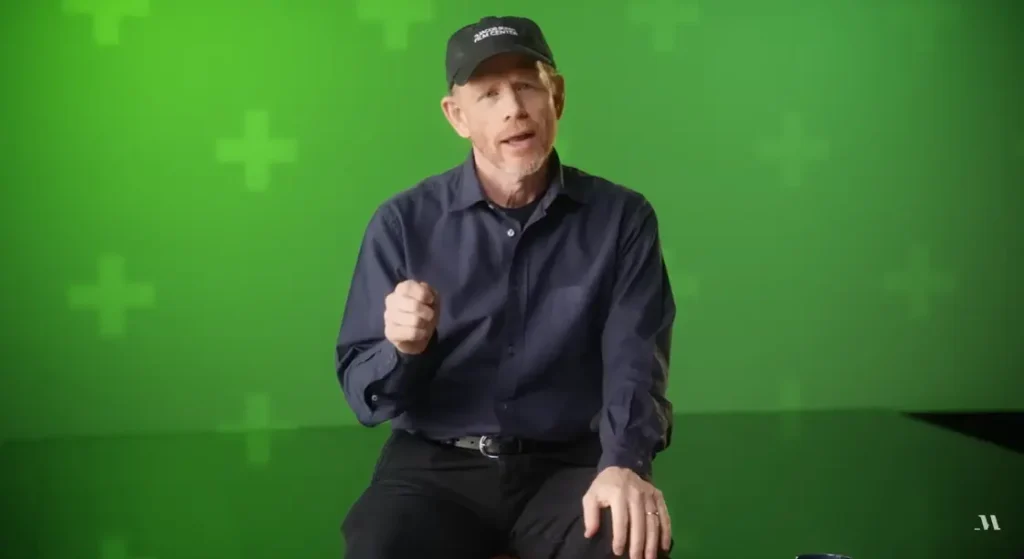
Developing the Film
In this comprehensive lesson, Howard gives you an overview of what it takes to develop a film. He walks you through the process of finding the writer, building project momentum, and completing the movie’s narrative.
Additionally, he shares practical insights on the other parts of the development, like budgeting, casting, and creating a vision that aligns with the different departments of the filmmaking process and allows them to work in the same direction.
Lastly, he shared some of the practical things to consider before making strategic choices and the challenges you will face in developing a successful film.
What I liked about this lesson was his practical advice on developing a successful film and creating relationships with the other departments of the team.
Collaboration Part 1 & 2
Collaboration is a vital element of success in any project; Howard emphasizes its importance in building successful films and how you can collaborate with the different departments of the team.
In addition, he shares some of his valuable insights into creating a positive working environment and setting people’s expectations. Most importantly, he teaches you how to align them with your vision.
He also mentions that as a director, you are the creator of the story, and you need to focus on every vital thing that can make your story and film even more powerful and relatable to the audience.
Some of the important things that he has covered in this lesson include
- How to engage with the departmental heads for project logistics?
- How to build the reaction with the different members of the department?
- When to give creative opportunities to your teams?
- How to collaborate with the different stages of the projects?
Furthermore, he also shares some of the key collaborations that have made his film successful and gives examples of other directors who are experts in the art of collaboration.
What I liked about this lesson was Ron’s practical ways of creating a balanced working environment and relationship with the team.
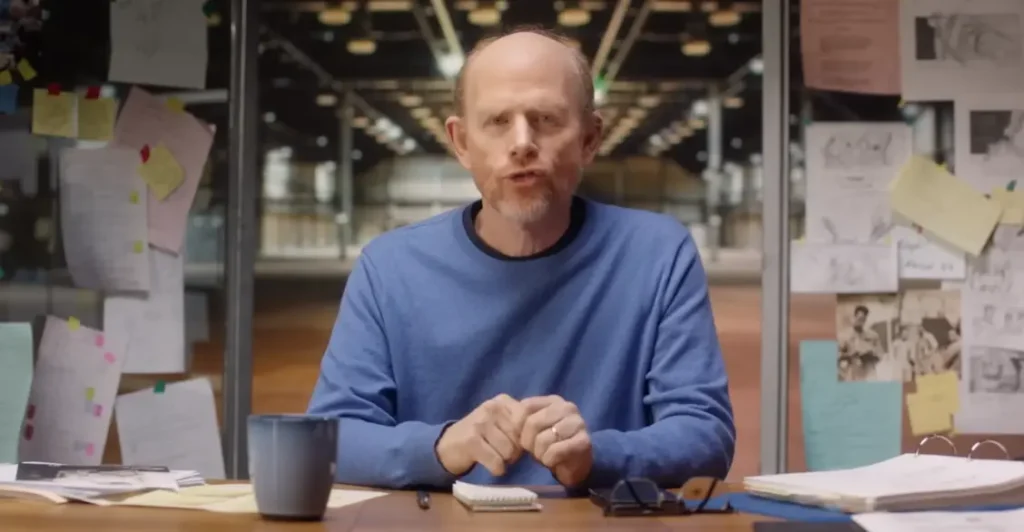
Working with Cinematographers
In this lesson on working with a cinematographer, Ron has highlighted the crucial role of the cinematographer and why he is an important person in converting your vision into the screen.
He shared his approach to communicating effectively, presenting your ideas to the cinematographer, and collaborating with them to create visually stunning and impactful shots that enhance your storytelling.
Some of the other things that Ron covers in this lesson include
- How do you connect with a cinematographer?
- How to share ideas and common goal with cinematographer?
- How to explain the job of cinematographer?
As someone with years of experience in directing, Ron demonstrated a unique perspective on building a working relationship with a cinematographer and effectively communicating your ideas with them to create a compelling story.
Furthermore, he also shared his experience with acting skills and how they helped him in his career as a director.
What I liked about this lesson was the personal method of building the reaction with the cinematographer and communicating your ideas to create exceptional shots.
Cinematography
After teaching you how to work with the cinematographer, Ron teaches you about cinematography and his approach to directing; he teaches you various techniques, such as understanding camera angles, lighting, framing, and movement and how to use them properly to evoke the emotion of the characters.
Additionally, he uses the example of his own film, The Beautiful Mind, to teach you how it communicates with the audience and conveys the message.
Ron uses this film as an example to explain every process of cinematography in detail, from selecting the right colors to finding the themes building the story and choosing the right character to create an exceptional story; some of the important things that he discusses in this lesson includes
- How do you decide the theme of the story?
- How do you build a character that connects with the people?
- How to convey the right message using storytelling?
At the end of this lesson, he shared his method of learning cinematography, mostly through experimentation and collaboration with other people.
He concluded this lesson by sharing some resources you can use to research cinematography and build the right skills.
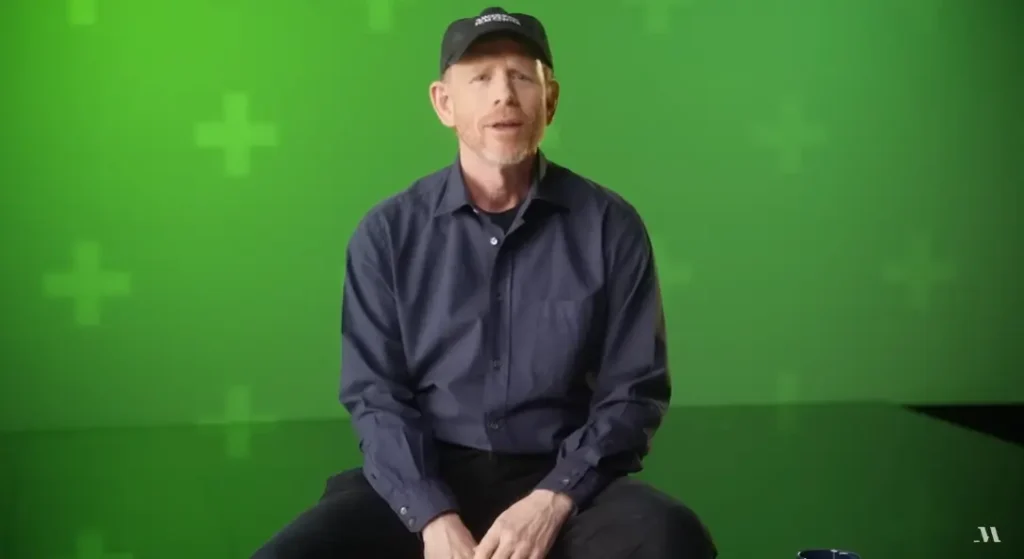
Production Design
Apart from the cinematography, this lesson signifies the importance of the production designer’s creative contribution to developing impressive films.
He shares his personal approach to collaborating with the production designers and communicating ideas effectively in order to develop the visual element that aligns with your film’s vision; some of the other things that have been included in this lesson are
- What is the role of the production designer in filmmaking?
- How to Communicate the ideas with the production designer?
- How to collaborate with the production designer?
Overall, this section gives you a good overview of production design and why it is essential to achieving your vision.
Case Study: Frost/Nixon
It is one of the interesting case studies of this master class, where Ron discusses his film “Frost/Nixon” And lays out the concept and various aspects of the filmmaking process.
He also walks you behind the scenes of this film and shares the details from writing the script to developing the character to casting and the challenges they have faced on the set during the production to achieve such amazing results.
In addition, he also demonstrated what he wanted to achieve when he was shooting for this movie and what kind of shooting style should reflect the right character. This covers every detail of this project.
Most importantly, he also discusses why he wanted to do the film Forst/Nixon and how he realized that he would work with the cinematic possibilities; at the end of thi video, he gives some of the tools he used to research for this film.
Research
Research plays a vital role in developing a film and creating a compelling story. In this lesson, Howard discusses his approach to researching historical events, real-life characters, and visuals for his films. He even discusses his research process for the creation of Cinderella Man.
However, he also covers various research methods, such as Consulting with an expert, studying material from the Internet, visiting the location, and conducting interviews with people.
Furthermore, he highlighted how research plays a crucial role in the decision-making process, character-building, and the essence of the story.
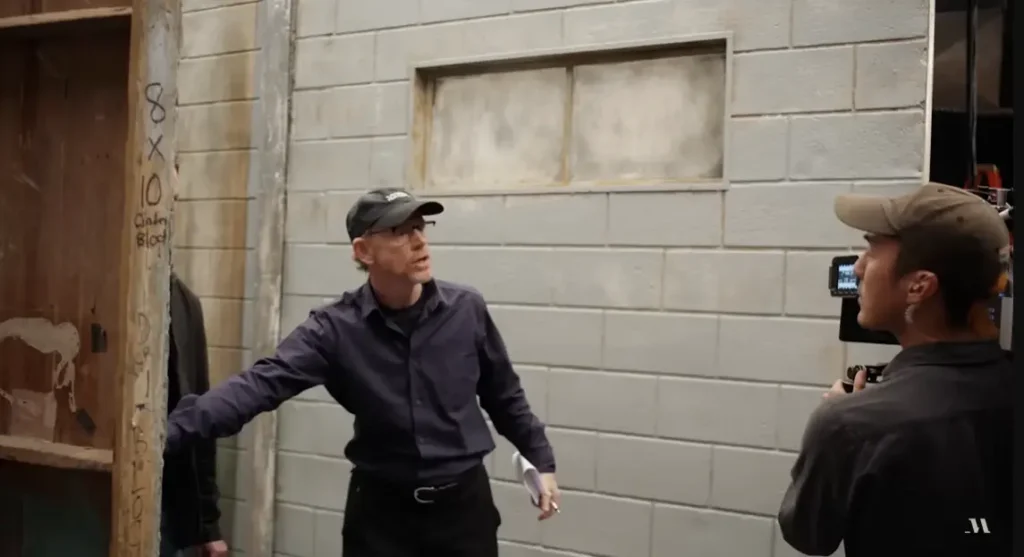
Scene Deconstruction: Raiders of the Lost Ark, Apollo 13, and A Beautiful Mind
It is a combination of relations, where Harvard has taken the same from his three films and broken down the creative decisions, technical aspects, and storytelling techniques that he has used in the film to make it a memorable moment for the audience.
The best thing about this lesson is that it is very easy to understand. You will watch the clips simultaneously while Ron explains his technique for making the scene successful.
He has also shared his insider knowledge of the thought process behind the camera angle performance choices and the actor’s selection for every film he has explained in this lesson.
What I like about this lesson is that he has shared practical tips on creating memorable scenes in the film and making them more entertaining for people.
Casting the Right Actor
No matter how great your story or script is, if you don’t select the right actor for the scene, it will not connect with the audience and will ultimately fall flat.
This lesson covers the crucial process of casting the actor for a film and, for that role, shares the William Wyler formula for Casting as he believes that there are certain ways of finding the right actor.
Some of the other lessons covered in this video include the following:
- Use your gut instinct when casting an actor
- Mistakes to avoid while casting actor
- Following the right process for Casting.
Furthermore, he also shares the list of the challenges that you might face in Casting for a specific role, such as a historical figure or any character with some unique trades for the background.
Working with Actors
Finding the right actor is important, but it is also important to learn about working with the actor. In this lesson, Ron shared the importance of building a relationship with the actors to increase their performance in the filmmaking process.
Not only that, but he has also shared his personal approach to building such a relationship. Lastly, he stressed the importance of feeling empathy for the actors and not treating them as perfectionists.
Instead, you should give them tips on how they can improve on the part that they are struggling with for a specific scene. Some of the other lessons that you will learn in this video include
- How to balance directing and collaborating?
- How to understand the actors and build relations with them?
- How to appreciate your actors and guide them for the role?
Overall, this lesson is all about building relationships with the actors and guiding them in their performances to get the most out of their acting skills. Lastly, you should also focus on giving honest feedback; it will help them improve their performance in the rehearsal.
It is one of the exciting parts of the score, where the instructor explains the importance of rehearsal and shows you real examples and case studies from his movie Frost/Nison.
Staging Frost/Nixon
Ron shows you the exact rehearsal clips of his film and teaches you what an actor’s actual rehearsal looks like.
For me, it is one of the inside full lessons that gives practical exposure to what a film rehearsal looks like and how you can maximize it to get the best performance from your actors and other artists.
But one of the things that is a bit weird for me is that Role has just shown you several clips of the rear cell where the actors are communicating with each other. Still, he has not guided and addressed this chapter, and, most importantly, he did not explain the jargon with the issue for me and many learners.
Editing Part 1 & 2
It combines the two parts of the editing course, where the instructor, Ron, shares his entire editing process and teaches you the art of editing.
He demonstrated the principles of effective editing, including pacing, rhythm, and continuity, that can enhance your storytelling and showed you how all of these elements can impact your story.
For him, editing is the final rewrite, and he explains this concept better than he has represented the scene of the movie, which shows how editing choices can impact the storyline of your film.
Furthermore, he explains the importance of a great editor and how to build a relationship with him to maximize the film’s potential; these lessons also cover what to look for when searching for an editor.
What I liked about this lesson is that he shared teh example of one of his successful films, Apollo 13, and its writing process, which makes things a lot easier to understand.
Sound Design
In this sound design lesson, Ron has focused on the curious part of sound design in filmmaking. He shared his insight into how sound can influence the emotional impact of a story scene or any atmosphere.
And how it can influence your story and contribute to the overall storytelling experience.
Furthermore, he also discusses the importance of sound effect dialogue clarity and the integration of the sound element in the filmmaking process to make it even more relatable and entertaining for the audience.
For instance, he used the example of one of his films and broke down how the specific sound choices, such as some effect, can save the audience’s perception towards the specific scene character or the whole film.
Music and scoring
In the previous lessons, his role shared the importance of working with the actors and the production designer; similarly, in this action, he heard the importance of working with the composer and giving them creative freedom.
He also mentioned that the composer and actor are the two essential elements in conveying a story that resonates with people.
Moreover, he also teaches you the difference between music and scoring and shares how some of the film scores developed. He also mentions the challenges he faced in adding music to his film.
What I liked about this lesson was his tips on collaborating with the composer and explaining your ideas and vision so that they can compose the music that enhances the emotional strength of the story and grabs the people’s attention.
Find a story you love
It is the last lesson of the scores where we explain a story that you are genuinely passionate about and interested in creating the story out of.
He encourages aspiring filmmakers to follow their creative instincts, be ready for challenges, never lose hope, and focus on their vision for crafting the story for the big screen.
Lastly, he has shared some of the antidotes that have helped him throw out his career as a director and filmmaker for making various films and walking with different actors, composers, and production designers.
Who Should Consider Ron Howard Masterclass?
You have seen the overview of the course and the topics it teaches you about filmmaking.
But one of the most common questions is who would consider buying this course.
So, let’s dive deep into this and understand the target audience of the course. In general, three types of people can rule in the course and benefit from it.
Aspiring film director
If you are considering film directing as a career, then this course is a valuable resource that can help you understand the important concepts of the filmmaking process, from developing the story to postproduction to casting the actors and working with them.
This master class is one of the most comprehensive courses available, teaching you everything you need to know about directing.
Film-making students
If you are a student learning about filmmaking and its processes, then this master class can be worth considering. It offers you the unique opportunity to learn directly from a legendary director who has produced some of his career’s most successful and memorable movies.
The best part is that he also shares real-life case studies and behind-the-scenes filmmaking movements, making the schools even more excellent twice for the people.
Ron Howard fans
This course is worth considering for fans of Ron Harvard. He is one of the generation’s most popular directors, and this course teaches you everything he has learned from his mistake of becoming a successful film.
The good news is that you will learn about directing and get to know Ron as a person, which will help you connect with them even more closely and ensure that you understand every concept flawlessly.
Ultimately, there is no limit to who can enroll in the schools, but my personal recommendation is that if you are seriously interested in learning filmmaking processes and making a successful career out of it, then you should consider buying this course.
What do I like about Ron Howard’s masterclass?
Now that you have a complete idea of what the scores offer and who should consider this course, let me tell you a few things I like about it before deciding to invest your money in it.
Detailed guide on filmmaking
As mentioned at the start of the article, I have taken various will-making courses, but this one stands out in terms of providing value.
From my experience, it is one of the most in-depth guides about filmmaking and directing. The teacher teaches you every filmmaking process, from finding inspiration to creating stories, casting directors, building a relationship with actors, editing case studies, real-life examples, and more.
What I like most about this course is that it explains every new concept in detail, making it much easier for people to understand.
Practical knowledge
You can obviously expect this from the scores, especially if you are taking the Master class subscription.
In this master class, Rohan Harvard failed the practical lesson, real-life examples of case studies, behind-the-scenes of the movies, and, most notably, his lesson and the journey, which make the scores even more valuable.
What excites me most is that Roar not only shares the typical theory lesson and series of videos but also shows you how to get things done in real life by using the real-life example of his most popular.
Helpful suggestion
If you have gone through all the lessons that I have saved, you will also notice one common pattern: Rohan has not only shared his wisdom and insights on the filmmaking process but also provided some helpful resources and suggestions throughout the course.
He also suggested some brilliant movies directed by incredible actors in the filmmaking industry.
Practical Examples and Case Studies
Throughout this master class, you will have access to all the real-life examples and case studies that the instructor has shown, especially in the storytelling and editing part. This allows you to observe how things get done in real life and how you can find your uniqueness in this noisy world.
The best parties used Apollo 13 as an example to explain the concept of storytelling and editing. It is one of the movies that led Ron to win an Oscar.
Things that can be improved in this master class?
You have seen the overview of the things that I liked most about this course, so let’s move forward and see what can be improved to make it even better for the learners.
Discontinued example
One downside to the scores that I have observed is that the Run has used several examples to make the concept easy to understand for the learner.
However, I feel that if the examples were similar and connected throughout the course, it would improve the flow of learning.
Unexplained jargons
There is no doubt that Rohan is a great filmmaker and a teacher who knows how to connect with students.
But one thing that can be a problem for many people, including me, is that sometimes he does not explain the terms that he has used in the scores and the sad parties; it is not even explained in the workbook.
A bit hard for beginners
This course is an absolute jam, created to serve the people and help them understand the concept very easily, but some of the terms used in the scores are a bit complicated, and I need to check the workbook and the glossary section to understand it.
Sometimes, it even seems that the workbook that was provided with the scores does not mention it, so I think adding a glossary section, especially for terms that have not been explained in the scores, might be a great value for the learner.
Ron Howard Masterclass Review: Pros and Cons
As I have mentioned many times, each course has its pros and cons, and as a learner, it’s vital for you to consider it before investing your hard-earned money. Let’s see the pros and cons of Ron Howard’s Masterclass.
Here’s a combined table with the pros and cons of the Ron Howard Masterclass, written in short and easy-to-understand language:
| Pros | Cons |
|---|---|
| Learn from a legendary director with decades of experience | No direct interaction or feedback from Ron Howard |
| Get an inside look at Howard’s filmmaking process and techniques | No certification or formal accreditation is provided |
| Comprehensive coverage of all aspects of directing, from story development to post-production | Limited to Howard’s perspective and style of directing |
| Valuable insights into working with actors, cinematographers, and other crew members | No certification or formal accreditation provided |
| Behind-the-scenes footage and case studies from Howard’s iconic films | Requires a significant time commitment to complete all lessons |
How much does the Ron Howard cost?
As mentioned at the start of this post, this course is hosted on the Masterclass platform, which is popular for offering high-quality courses. You need to buy a subscription to this platform to get access to the Judd Apatow masterclass.
Currently, this platform offers customers three types of subscription options that you can consider based on your requirements and budget.
- Standard Plan: $120 Per Year ( Access to 1 Device and No offline Mode)
- Plus: $180 Per year (access to 2 Devices and Offline Mode)
- Premium: $240 Per Year (access to 6 Devices and Offline mode)
Each of the plans has its specifications. To get more idea about the pricing of the masterclass, you can check out the complete guide on the masterclass review.
Is it worth buying Ron Howard master class?
Yes, absolutely. In my experience, it is worth buying Ron Howard’s master class, especially if you are an Aspiring filmmaker or anyone who has a deep passion for becoming a successful filmmaker and director.
In this course, Ron Howard shares everything he has learned from his 40-year journey as a director and his various films, which have generated billions of dollars in revenue.
However, you should also consider that this course requires significant time and commitment to complete and gain the proper knowledge of the filmmaking process. If you have time constraints, then it is not worth it.
Overall, if you are serious about pursuing a career in filmmaking or simply want to understand the craft of creating a successful film.
In that case, Ron Howard’s master class is a worthwhile investment that allows you to learn from the legendary director and filmmaker.
Alternatives to Ron Howard MasterClass
From the above post, you get the idea and the in-depth review of the Ron Howard Masterclass that will help you determine whether it’s worth considering this course.
But if you master the skill of filmmaking, there are some other filmmaking courses that you can consider and invest your time.
This post provides an overview of this course, which will help you decide whether it’s worth your money and time.
- James Cameron Teaches Filmmaking: A MasterClass Review
- Neil Gaiman MasterClass Review: 4 Mind-Blowing Takeaways!
- Aaron Sorkin MasterClass Review: Worth it? – 5 Takeaways
- David Lynch Masterclass Review in 2025 [Is it worth buying?]
Conclusion
Overall, Ron Howard’s masterclass offers you a comprehensive guide to becoming a successful director and filmmaker.
If you are thinking of making a successful career and looking for proven knowledge to start your journey, then there is no better option than considering the Ron Howard Masterclass
So this is my honest Thomas Keller masterclass review post, where I have sealed everything you need to know before enrolling in the course.
But if you still have any questions about this masterclass, please let me know in the comment section, and I will be happy to assist you.

